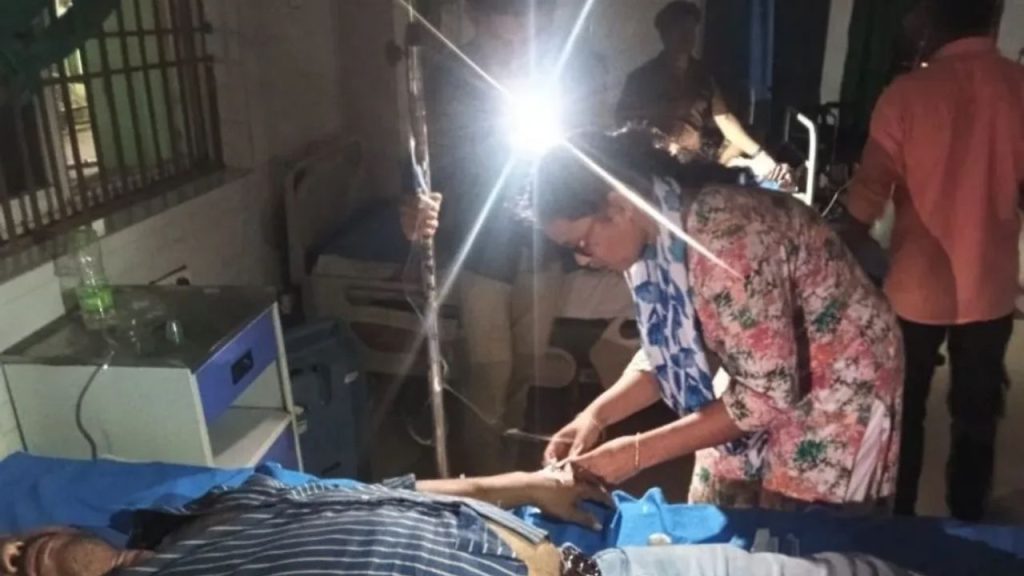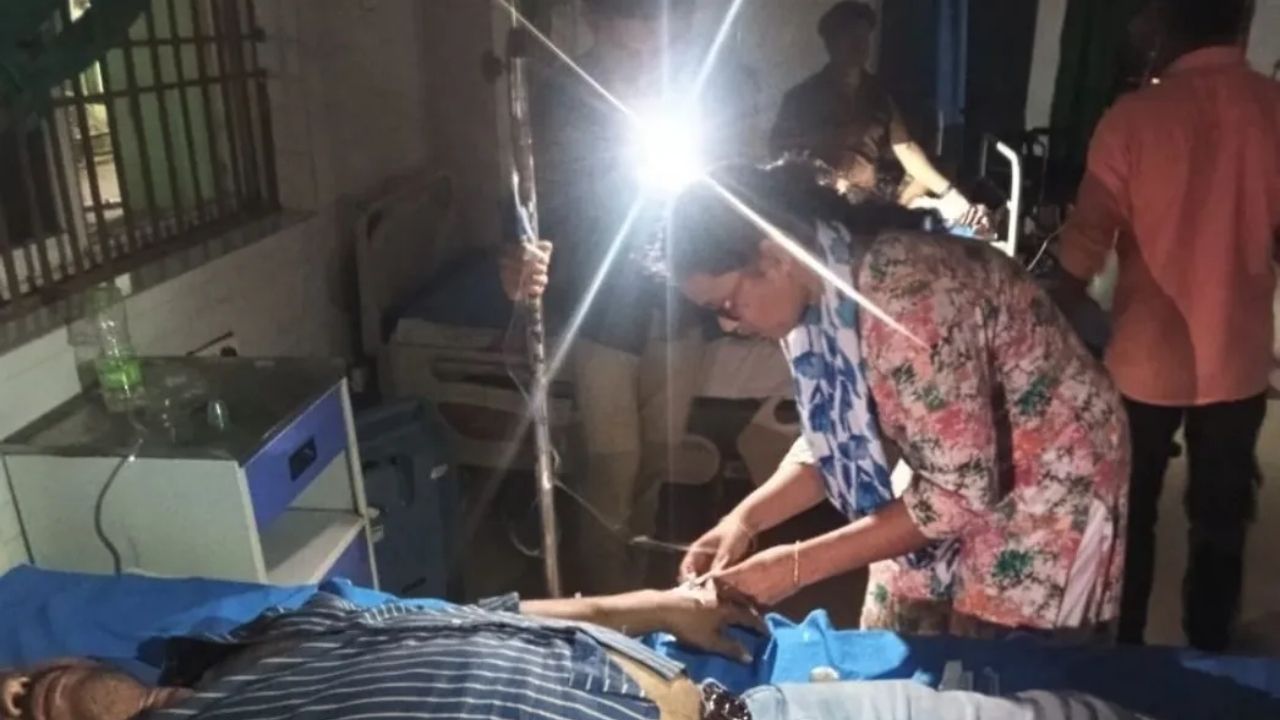In a recent incident at the Jagatsinghpur District Headquarters Hospital in Odisha, India, power outages disrupted critical healthcare services. Staff had to rely on mobile phone flashlights to treat a patient under challenging conditions. This power cut has sparked outrage from local communities and activists, who are demanding urgent action to prevent future disruptions. Hospitals, as vital public health facilities, must ensure that power supply interruptions do not compromise patient safety. In this article, we’ll explore how hospitals can address power supply challenges, the importance of reliable backup systems, and how such incidents can be prevented.

Jagatsinghpur Hospital Faces Power Cut
| Topic | Details |
|---|---|
| Incident | Jagatsinghpur Hospital faced a power cut while treating patients in critical care. Medical staff had to use mobile phone flashlights. |
| Response | Backup generators were reportedly delayed, and power was restored only after a brief interval. |
| Community Impact | The power outage caused outrage among the local community, calling for better infrastructure and backup systems. |
| Action Needed | Hospitals need to prioritize reliable power sources, including fast-acting backup generators, to ensure patient safety. |
| Example | A similar incident occurred at VIMSAR in Burla, where chemotherapy treatments were conducted under mobile lights. |
| Urgency | The incident highlights the need for proactive measures in healthcare facilities to prevent such emergencies. |
| Source | Times of India |
In conclusion, the recent incident at Jagatsinghpur Hospital underscores the vital need for healthcare facilities to have reliable power backup systems. These systems are not only a convenience but a matter of life and death. As we move into the future, hospitals must invest in technology, conduct regular drills, and collaborate with local authorities to ensure that power disruptions never interfere with patient care. By doing so, they will continue to be a source of trust and safety in their communities.
Understanding the Power Cut Incident
The Jagatsinghpur Hospital incident highlighted the glaring risks posed by power outages in healthcare facilities. During the power cut, the medical team struggled to administer treatments under the dim light of mobile phone flashlights. This situation points to a larger problem: many hospitals and healthcare centers are not fully equipped to handle power disruptions, even though these facilities are some of the most critical parts of our communities.
When power cuts occur, essential services like dialysis, chemotherapy, and even emergency surgeries can be delayed or compromised. In this case, the hospital staff had to perform procedures without proper lighting, which could have led to mistakes or complications. Thankfully, no major mishap occurred, but the potential consequences could have been dire.
How Often Do These Power Cuts Happen?
According to the World Health Organization (WHO), power interruptions are common in many healthcare facilities, especially in underfunded regions. A study published by The Lancet found that about 20-30% of hospitals in low-income countries face regular power outages, making the healthcare infrastructure more vulnerable.
In India, the National Disaster Management Authority (NDMA) emphasizes the importance of having a backup power plan, especially in hospitals, because a lack of power can disrupt not just treatment but also the communication needed for effective healthcare delivery.
How to Prevent Power Outages in Hospitals: A Practical Guide
For hospitals to function optimally, uninterrupted power is crucial. Not only is it required for lighting and basic operations, but it’s essential for critical care equipment, including ventilators, incubators, and oxygen supply machines. Here’s a breakdown of the steps hospitals should take to avoid future power disruptions.
1. Invest in Reliable Backup Power Systems
Generators are a must-have for all healthcare facilities. These should be able to kick in immediately when there’s a power failure, and they should be regularly maintained to avoid delays. UPS (Uninterruptible Power Supply) systems should also be implemented for short-term support, especially in emergency rooms.
Pro Tip: Hospitals in high-risk areas for power cuts should invest in solar power systems or other renewable energy sources. Solar energy, in particular, can help reduce the reliance on grid electricity and provide a backup during blackouts.
2. Conduct Regular Power Supply Drills
It’s essential for hospital staff to regularly practice power outage drills to ensure that everyone knows how to respond effectively. This includes switching to backup systems, providing care with alternative lighting, and having clear communication during the transition.
Real-world example: Hospitals like the Mayo Clinic and Cleveland Clinic conduct regular drills and have detailed power outage response plans that ensure patient safety in case of an emergency.
3. Ensure Proper Power Grid Connection
Hospitals need to make sure that their main power connections are stable and reliable. In some regions, frequent power cuts are due to the grid itself being old or underdeveloped. In these cases, upgrading infrastructure or switching to more reliable power sources can solve the problem.
4. Use Advanced Technology for Monitoring
Hospitals should use modern technology to monitor power usage and backup systems. This includes having smart meters that notify staff about any fluctuations or interruptions in power supply. These systems can also alert when a generator fails to start, allowing for quick intervention.
5. Work with Local Power Authorities
Hospitals should work closely with local power authorities to ensure that they are prioritized during outages. In many cases, local utilities offer special power backup arrangements for critical facilities, including hospitals.

The Importance of Proper Backup Systems in Healthcare
Reliable power backup systems are not just a convenience; they’re a matter of life and death. Hospitals need to understand that patient care and safety are always at the center of their operations. In critical care, even a few minutes without power can lead to the loss of a life.
For example, in the case of dialysis patients, missing a treatment session due to power outages can lead to fluid imbalances or toxicity, both of which can be fatal. Similarly, chemotherapy patients rely on constant power to maintain their treatment schedule.
In addition, having an effective power backup system builds trust in the community. When people know their local hospital can handle emergencies without compromise, it reassures them that the healthcare facility is ready to face any challenge.
Why This Is Crucial for the Future of Healthcare
The Jagatsinghpur Hospital power cut incident is a reminder of how vulnerable our healthcare systems can be if they don’t plan for power disruptions. While the technology for reliable backup power exists, many healthcare facilities, especially in rural or underserved areas, still lack the proper infrastructure.
The key to avoiding these disasters is proactive planning. Hospitals need to:
- Invest in reliable backup power systems that kick in quickly during a power outage.
- Regularly train staff on emergency protocols, including how to operate under low-light conditions.
- Collaborate with local authorities to ensure they are prioritized during power cuts.
By ensuring reliable power sources, hospitals can continue providing care without interruption, even in the most challenging situations.
Jajpur College HoD Faces Sexual Harassment Allegations; Internal Committee Formed
Two Minor Girls Found Pregnant in Odisha Government Hostels: Investigations Underway
Man Murders Wife Over Affair Suspicion, Disposes Body in Sundargarh River
FAQs
1. Why are power cuts such a big deal in hospitals?
Power cuts in hospitals are dangerous because they can delay or disrupt critical treatments like surgeries, dialysis, and chemotherapy. Without reliable power, life-saving equipment can fail, putting patients at risk.
2. What can I do if my local hospital doesn’t have proper backup systems?
If you’re concerned about your local hospital’s ability to handle power outages, consider reaching out to local authorities or healthcare advocacy groups. They can help ensure that necessary upgrades are made.
3. Are power outages common in hospitals worldwide?
Unfortunately, yes. Power outages are a recurring problem in many hospitals, especially in regions with poor infrastructure or unreliable grids. However, many hospitals are adopting backup power systems like generators and solar panels to reduce this risk.





